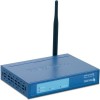TRENDnet TEW-453APB User Guide - Page 44
Output Power Level, RTS/CTS Threshold
 |
UPC - 710931502732
View all TRENDnet TEW-453APB manuals
Add to My Manuals
Save this manual to your list of manuals |
Page 44 highlights
Access Point Setup Parameters Disassociated Timeout Fragmentation Beacon Interval RTS/CTS Threshold Preamble Type Output Power Level Antenna Selection 802.11b Protection Type Short Slot Time Protection Mode Protection Rate This determines how quickly a Wireless Station will be considered "Disassociated" with this AP, when no traffic is received. Enter the desired time period. Enter the preferred setting between 256 and 2346. Normally, this can be left at the default value. Enter the preferred setting between 20 and 1000. Normally, this can be left at the default value. Enter the preferred setting between 256 and 2346. Normally, this can be left at the default value. Select the desired option. The default is "Long". The "Short" setting takes less time when used in a good environment. Select the desired power output. Higher levels will give a greater range, but are also more likely to cause interference with other devices. If your Access Point has only 1 antenna, there is only 1 option available. If your Access Point has 2 antennae, select the option which gives the best results in your location. Select the desired option. The default is CTS-only. Enable or disable this setting as required. The Protection system is intended to prevent older 802.11b devices from interfering with 802.11g transmissions. (Older 802.11b devices may not be able to detect that a 802.11g transmission is in progress.) Normally, this should be left at "Auto". Select the desired option. The default is 11 Mbps. 41















